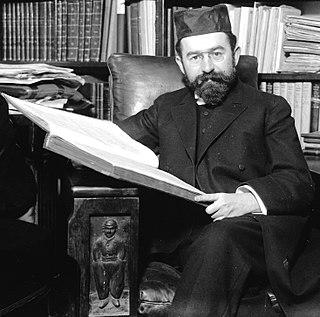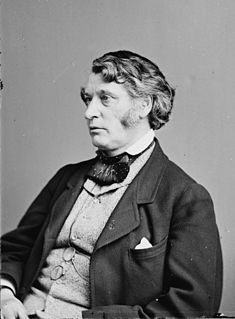A Quote by Charles Spurgeon
Man loves his own ruin. The cup is so sweet that though he knows it will poison him, yet he must drink it. And the harlot is so fair, that though he understands that her ways lead down to hell, yet like a bullock he follows to the slaughter till the dart goes through his liver. Man is fascinated and bewitched by sin.
Related Quotes
The rich man has his motorcar, His country and his town estate, He smokes a fifty-cent cigar And jeers at Fate. He frivols through the livelong day, He knows not Poverty, her pinch. His lot seems light, his heart seems gay; He has a cinch. Yet though my lamp burns low and dim, Though I must slave for livelihood- Think you that I would change with him? You bet I would!
A woman knows very well that, though a wit sends her his poems, praises her judgment, solicits her criticism, and drinks her tea, this by no means signifies that he respects her opinions, admires her understanding, or will refuse, though the rapier is denied him, to run through the body with his pen.
He that can toy with his ministry and count it to be like a trade, or like any other profession, was never called of God. But he that has a charge pressing on his heart, and a woe ringing in his ear, and preaches as though he heard the cried of hell behind him, and saw his God looking down on him-oh, how that man entreats the Lord that his hearers may not hear in vain!
That same night, I wrote my first short story. It took me thirty minutes. It was a dark little tale about a man who found a magic cup and learned that if he wept into the cup, his tears turned into pearls. But even though he had always been poor, he was a happy man and rarely shed a tear. So he found ways to make himself sad so that his tears could make him rich. As the pearls piled up, so did his greed grow. The story ended with the man sitting on a mountain of pearls, knife in hand, weeping helplessly into the cup with his beloved wife's slain body in his arms.
There is a time in every man's education when he arrives at the conviction that envy is ignorance; that imitation is suicide; that he must take himself for better, for worse, as his portion; that though the wide universe is full of good, no kernel of nourishing corn can come to him but through his toil bestowed on that plot of ground which is given to him to till. The power which resides in him is new in nature, and none but he knows what that is which he can do, nor does he know until he has tried.
Man is the only animal that deals in that atrocity of atrocities War. He is the only one that gathers his brethren about him and goes forth in cold blood and calm pulse to exterminate his kind. He is the only animal that for sordid wages will march out... and help to slaughter strangers of his own species who have done him no harm and with whom he has no quarrel.... And in the intervals between campaigns he washes the blood off his hands and works for the universal brotherhood of man with his mouth.
The Senator from South Carolina has read many books of chivalry, and believes himself a chivalrous knight, with sentiments of honor and courage. Of course he has chosen a mistress to whom he has made his vows, and who, though ugly to others, is always lovely to him; though polluted in the sight of the world, is chaste in his sight I mean the harlot, Slavery. For her, his tongue is always profuse in words.
She began now to comprehend that he was exactly the man who, in disposition and talents, would most suit her. His understanding and temper, though unlike her own, would have answered all her wishes. It was an union that must have been to the advantage of both: by her ease and liveliness, his mind might have been softened, his manners improved; and from his judgement, information, and knowledge of the world, she must have received benefit of greater importance.
Most of the world's great souls have been lonely. Loneliness seems to be one price the saint must pay for his saintliness... Always remember: you cannot carry a cross in company. Though a man were surrounded by a vast crowd, his cross is his alone and his carrying of it marks him as a man apart. Society has turned against him; otherwise he would have no cross. No one is a friend to the man with a cross.
Man alone knows that he must die; but that very knowledge raises him, in a sense, above mortality, by making him a sharer in the vision of eternal truth. He becomes the spectator of his own tragedy; he sympathizes so much with the fury of the storm that he has no ears left for the shipwrecked sailor, though the sailor were his own soul. The truth is cruel, but it can be loved, and it makes free those who have loved it.
God, Who is by nature good and dispassionate, loves all men equally as His handiwork. But He glorifies the virtuous man because in his will he is united to God. At the same time, in His goodness he is merciful to the sinner and by chastising him in this life brings him back to the path of virtue. Similarly, a man of good and dispassionate judgment also loves all men equally. He loves the virtuous man because of his nature and the probity of his intention; and he loves the sinner, too, because of his nature and because in his compassion he pities him for foolishly stumbling in darkness.



































